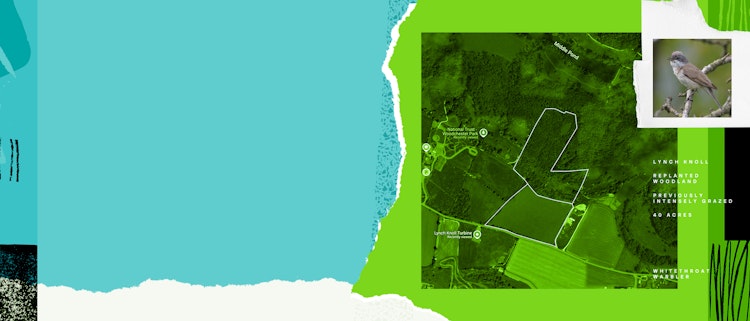Autumn Rewilding – Beavers, Scrapes and Raptors at Work
Autumn rewilding in action: Chris Packham and the team build beaver habitats, bird scrapes and raptor perches to boost British biodiversity.

Situated five miles from Ecotalk HQ in Gloucestershire, Lynch Knoll is a project started by our sister company, Ecotricity, in 2004. Now run by Ecotalk, this 40-acre site provides an excellent demonstration of how we turn our profits into protected spaces for nature to flourish.
The site is located just across the road from Ecotricity’s very first wind turbine, built in 1996. When the company reached 20,000 customers in 2004, it planted one tree for each customer in a 20-acre woodland space on the south slope of Woodchester Valley. This area was once part of a vast, ancient forest, but its trees had been cleared to graze cattle.
To restore the woodland, we planted a native broadleaf mix comprised of oak (28%), ash (25%) and beech (20%). The remaining 27% of the area was planted with an assortment of minor trees and shrubs including alder, field maple, birch, hornbeam, hazel, holly and dogwood.
The mix was designed so that as the wood matured, it would become home to a variety of wildlife, beginning with insects and small birds, to be followed by larger birds, reptiles, amphibians and mammals. Early on, we noticed the arrival of small copper and common blue butterflies, along with green-veined white, holly blue, comma and speckled wood species. Blackcap and lesser whitethroat birds quickly colonised the area.
Higher up, towards the road and the wind turbine, 10 acres has been left to run wild, gradually transforming into a wildflower meadow.
Alongside the wild space, we actively manage a 10-acre wildflower meadow. After a long period of intensive agriculture, the land needs a helping hand to get back to its natural state. By planting perennial flowers like comfrey, and sowing a variety of wildflower seeds every spring, we’re helping revive populations of pollinators in the area, including dozens of bee species. In some areas, we strip the ground bare, which helps mining bees make their nests.
The Lynch Knoll project has gone from strength to strength. The area that was once grazed now looks like a young wood, thickly covered in trees and other vegetation. Animals have moved in, including roe and muntjac deer, badgers, foxes, mice and voles. Hawks and kestrels hunt and nest here, and from the wildflower meadows across the scrubland border and on into the trees, Lynch Knoll is abundant with birds and insects.
If Lynch Knoll sounds like the kind of project you’d like to support, switch to Ecotalk. Find out more about our call, text and data packages on the Our Deals page of the site.